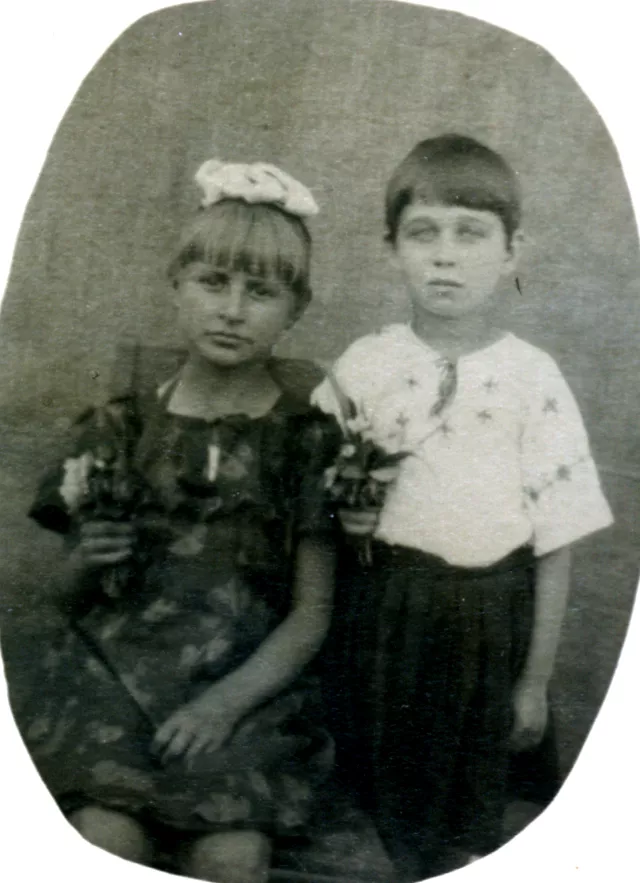This is a picture of me, on the right, and my friend Tamara. The photo was taken during our evacuation in Gulbach, Uzbekistan, in 1943.
We heard about the war on 22nd June 1941 at noon, when Molotov spoke on the radio. On the following day my father received a call-up from the military office. He joined the army on 26th June. There was panic in town.
We left in late August 1941 when Chernigov was bombed and many houses were on fire. The driver was in a hurry and actually threw us onto the truck. On the way to the railway station the truck stopped several times to pick up women with children. At the railway station we boarded a train for cattle transportation. Our trip lasted about ten days. We were hungry. My mother gave us a marmalade candy and a small piece of bread. At bigger stations the train stopped and my mother and her sisters went to get some hot water. Sometimes they brought some soup or warm cereals that were provided to passengers of the train. We finally arrived at a kolkhoz in Stalingrad region, 1,000 kilometers from home. I don't remember its name, but I remember how friendly the collective farmers were. We were accommodated in the house of a very hospitable woman. My mother and her sisters went to work at the kolkhoz. This was the harvest season and there were big crops. We, children, went to the bank of the Volga where we played with local children. The adults came from work late and were exhausted after a hard working day. We slept on mattresses on the floor. However, we could have plenty of vegetables, fruit, bread and cereals that the kolkhoz provided. We stayed there for two or three months. When it became clear that the war was going to last longer we decided to go farther east. We were afraid that fascist troops would soon arrive where we were staying.
In spring we moved to Gulbach, a settlement in Papskiy district, where we got a plot of land. We tried to grow vegetables there. Cabbage and potatoes didn't grow in this area. Local residents grew wheat or barley. Aunt Genia planted rice, but it didn't grow because there wasn't enough water. My cousin and I picked mulberries from a tree near an aryk. Uzbeks suspected that we were stealing water, which was as precious as gold. One of them ran after my cousin and me with a whip and threatened that he would kill us if he saw us again. We grew millet that summer and were happy to have it. I went to pick brushwood in the fields. I made huge bundles of it and dragged them home. We grew corn and roasted it on the fire: this was incredibly delicious. I also went to gather salt at a swamp with adults. It had a bitter taste and we had to wash it many times before we could use it. I had numerous wounds on my legs that didn't heal from standing in salty water.
I went to primary school in Gulbach in fall 1942. I went to the Russian class. Our teacher had evacuated from Chernigov. I had excellent marks in all subjects. When we had tests, children from wealthier families sat next to me to copy what I was writing. They offered me food for giving them permission to copy the tests, but I was too proud to accept it. I was rather ashamed of our poverty. I had a friend called Tamara. I helped her to do her homework at her place. Her mother knew that we were starving and always offered me some food or just a glass of milk, but I never accepted anything from her and said that I wasn't hungry.
I missed my father, my town, my home and my friends when we were in evacuation. I dreamed of a Ukrainian winter with snow. One morning I looked out of the window and saw something white. Being half asleep I decided it must be snow and ran outside, but it was only a big goose egg. Every day I ran outside to see the postman. We, kids, ran after him and were afraid to receive a death notification from him, but hoped to get a 'triangle' [letter] from the front. In summer 1943 the postman gave me a letter from my father. I ran to our house, yelling, 'Father is alive!'. We were happy and sent my father a long letter and photographs.
Lina Mukhamedjanova with her friend Tamara
The Centropa Collection at USHMM
The Centropa archive has been acquired by the United States Holocaust Memorial Museum in Washington, DC.
USHMM will soon offer a Special Collections page for Centropa.
Academics please note: USHMM can provide you with original language word-for-word transcripts and high resolution photographs. All publications should be credited: "From the Centropa Collection at the United States Memorial Museum in Washington, DC". Please contact collection [at] centropa.org.














